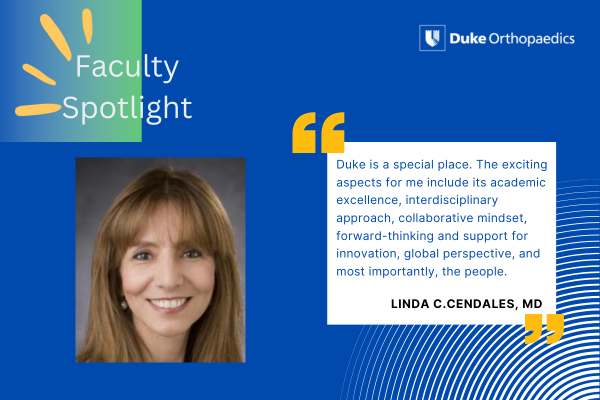Faculty Spotlight: Linda C. Cendales, MD

Title: Professor; Duke Health Scholar; Director, Vascularized Composite Allotransplantation; Councilor-at-Large, American Society of Transplant Surgeons; Secretary, Organ Procurement; and Transplant Network and the United Network for Organ Sharing
Outlook for Orthopaedics: I see several developments with hand surgery in the next several years. For example, minimally invasive techniques will continue to be implemented. Advances in devices, regenerative medicine, tissue engineering, imaging, surgical techniques, and the integration of augmented reality will likely continue experiencing growth. Rehabilitation is an essential component of hand surgery, and developments in robotics and virtual and sensor-based approaches in this area may also experience growth.
Incorporating artificial intelligence into health care will become more prominent. Progress in natural language processing, computer vision, and approaches to personalized experiences and conditions will continue to grow and play an important role.
Why Duke? Duke is a special place. Exciting aspects for me include its academic excellence, interdisciplinary approach, collaborative mindset, forward-thinking and support for innovation, global perspective, and most importantly, the people.
Education and Training: I finished high school in Bogota, Colombia, where I won a merit-based scholarship to study college abroad. I accepted it at Waterford KaMhlaba, United World College of Southern Africa in Mbabane, Eswatini (a.k.a. Swaziland). I became the first student from Colombia at Waterford KaMhlaba, in a class of 370 students from 72 countries. Subsequently, I received my M.D. from Universidad Metropolitana and completed a General Surgery Residency at the Hospital General Manuel Gea Gonzalez in Mexico City. I completed a Hand and Microsurgery Fellowship at the Christine M. Kleinert Institute in Louisville, KY, and a solid-organ Transplantation Fellowship and Research at the National Institutes of Health (NIH). Additionally, I completed a Certificate Program in Translational Research at Emory University.
Hometown: I was born in Bogota, Colombia.
Research: My career path evolved as a clinical researcher primarily interested in tissue reconstruction. I have expertise in the transplantation of vascularized peripheral tissues as a functional unit (e.g., hand).
While at Louisville, I participated in developing the first U.S. hand transplant team and was one of the surgeons who performed the first two hand transplants in the country. During my time at the NIH and under my influence, I designed and our research team established a non-human primate model for the study of vascularized composite all transplantation (VCA) and the testing of novel immunomodulatory medications. I transferred the model to the Yerkes Regional Primate Research Center in Atlanta and subsequently to Duke and continued the same line of research. At Duke, we established the hand transplant program and performed the first-hand transplant case in the State of North Carolina in May 2016.
Why did I choose a career in orthopaedic surgery? Positively impacting people’s lives is highly fulfilling. Surgery is complex. It requires hands-on, technical skills, problem-solving, and critical thinking. I enjoy the intellectual challenge and the continuous learning. Perhaps the most significant aspects for me are the relationships with my patients and the opportunity to enhance their quality of life. These, in combination with the required collaborative and team approach.